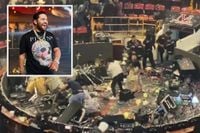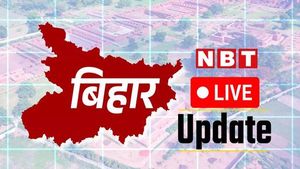On April 12, 2025, the performance of Mexican singer Luis R. Conriquez at the Feria Internacional del Caballo in Texcoco descended into chaos after he refused to perform narcocorridos, a genre of music often associated with drug trafficking and crime. This decision, made in compliance with new state regulations, ignited a furious reaction from the audience, leading to significant property damage and a swift evacuation by security forces.
Conriquez, known for his hit "Malas Rachas," had announced prior to the concert that he would adhere to the restrictions imposed by the Secretaría de Seguridad del Estado de México, which had recently sent notices to various municipalities, including Texcoco, urging them to prohibit performances that glorify crime. The legal basis for this crackdown is found in the Código Penal del Estado de México, specifically Article 211 Bis, which prescribes penalties of up to six months in prison for promoting criminal activities.
As the concert began, the audience anticipated hearing the popular narcocorridos that have propelled Conriquez's career. However, when the singer confirmed he would not perform these songs, the crowd's reaction was immediate and violent. Attendees began booing, hurling beer bottles, and throwing various objects—including chairs, ice, and even musical instruments—toward the stage in protest. Reports indicate that some fans vandalized sound equipment in their outrage.
Security personnel quickly moved to restore order, implementing an emergency evacuation of the venue to prevent further escalation of the situation. Despite the chaos, no injuries or arrests were reported during the incident.
The organizers of the Feria Internacional del Caballo have yet to release an official statement regarding the events, leaving many questions unanswered about the aftermath of the concert. The incident not only highlights the tensions between new legal restrictions and audience expectations but also raises concerns about the future of narcocorridos and similar musical genres in public performances.
In the days leading up to the concert, Conriquez had taken to social media to communicate his decision to stop performing narcocorridos. His posts reflected a sense of resignation, stating, "There are many people who don’t understand; they think we come to set the rules, but the truth is this: there will be no corridos in events from here on out for any artist, folks. Let’s keep going, those who truly support us will continue to do so even if I sing bachata or some other genre." This message was intended to prepare fans for his new musical direction, yet it failed to quell the discontent among concertgoers.
Conriquez's shift away from narcocorridos marks a significant change in his career, as he has built his reputation on the very genre he now shuns. The decision comes amid increasing pressure on artists across Mexico to avoid promoting crime through their music. The crackdown on narcocorridos has led several artists to cancel performances or alter their setlists to comply with the law.
This incident in Texcoco reflects a broader cultural and legal struggle in Mexico, where the glorification of crime in music has become a contentious issue. While authorities aim to curb the influence of narcocorridos, many fans feel a deep connection to the genre, viewing it as a form of expression that resonates with their experiences and realities.
As the dust settles from the chaotic concert, the future of Luis R. Conriquez's career—and that of narcocorridos—remains uncertain. With the state’s legal framework tightening around this genre, artists may find themselves at a crossroads, forced to choose between their artistic integrity and compliance with the law.
In the wake of the concert, the ongoing dialogue about the role of music in society and its potential impact on youth culture will likely intensify. It poses critical questions: Can artists continue to thrive while adhering to legal restrictions? How will fans react to changes in the music they love? As this situation evolves, both artists and audiences will have to navigate this new landscape together.







